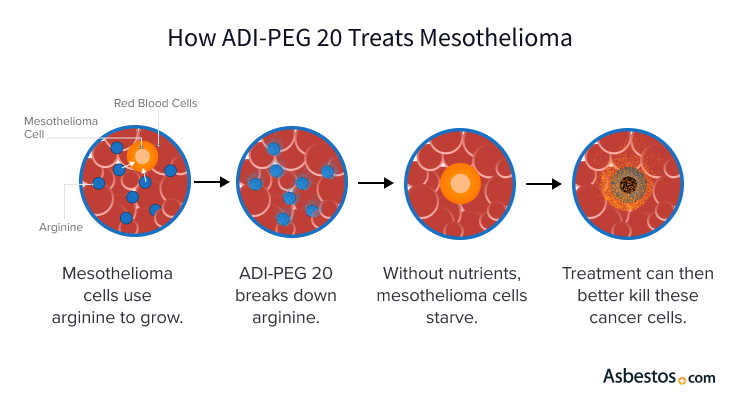
Pegargiminase
Pegargiminase is a new mesothelioma treatment. The drug contains an enzyme that finds and breaks down a specific protein cancer cells use to grow. This can slow tumor growth. Still in clinical trials, pegargiminase is improving outcomes when used with chemotherapy and other treatments.

What Is Pegargiminase (ADI-PEG20)?
Pegargiminase, known as ADI-PEG20, is a new type of cancer drug. It’s being studied as a treatment for mesothelioma. An enzyme therapy, this medication targets how cancer cells get their energy. This potential new mesothelioma treatment may improve outcomes for patients.
It’s made from a protein that comes from bacteria called arginine deiminase or ADI. It also contains polyethylene glycol or PEG. This helps the medicine stay in your body longer, reducing the chance of an immune reaction.
Key Facts About ADI-PEG20
- ADI-PEG20 is a medication used in what’s known as arginine depletion therapy.
- It lowers arginine in the body, which is a nutrient cancer cells need to grow.
- This can help slow the growth of mesothelioma tumors.
- ADI-PEG20 is being studied in combination with chemotherapy.
Pegargiminase is a promising new approach in the fight against mesothelioma. Because it’s still being researched, it’s considered an investigational drug. Arginine depletion therapy, using medications like pegargiminase, may offer a new weapon against this challenging cancer. Researchers hope it will improve the effectiveness of mesothelioma chemotherapy.
How May Pegargiminase Treat Mesothelioma?
Pegargiminase may be used to treat mesothelioma as a way to cut off the cancer cells’ food supply. Because ADI-PEG20 contains a specific enzyme (arginine deiminase), it can target and reduce the amount of a protein (arginine) mesothelioma uses to grow.
Healthy cells can usually make their own arginine, but some mesothelioma tumors cannot. This is the case for 2 mesothelioma subtypes: Biphasic and sarcomatoid mesothelioma, also known as non-epithelioid mesothelioma. These tumors must get arginine from the bloodstream to survive. Because they rely more on outside arginine, ADI-PEG20 is especially effective for people with nonepithelioid mesothelioma. Without arginine, the cancer cells struggle to grow and spread, making the tumor easier to treat.
This approach targets the tumor metabolism, which is how cancer cells use energy. Researchers are studying pegargiminase in combination with chemo for pleural mesothelioma. Combining it with chemo may make the treatment more effective. It’s hoped this approach will improve outcomes for mesothelioma patients.

Combining Pegargiminase With Chemotherapy
The most effective way to use ADI-PEG20 to treat mesothelioma is to pair it with other chemo drugs rather than using it alone. Researchers are studying this combination approach in clinical trials.
Cutting off their food supply appears to weaken cancer cells, making them more vulnerable to mesothelioma medications like chemo. Doctors hope this combo will improve survival rates and other important outcomes.
Using Pegargiminase with Other Treatments
Scientists are exploring pegargiminase with other treatments like immunotherapy for mesothelioma. Drugs like Tecentriq help the body’s own immune system fight cancer. Combining Tecentriq with pegargiminase might make the immune system’s attack on cancer cells more effective.
It’s also being studied with radiation, another common cancer treatment. Researchers are looking at how ADI-PEG20 can work best with these other therapies to give patients the best chance of fighting mesothelioma.

Pegargiminase in Clinical Trials
Several mesothelioma clinical trials are actively studying pegargiminase. These trials test how well it works and whether it’s safe and effective in combination therapies. According to the National Cancer Institute, pegargiminase trials are in different phases, looking at various aspects of the drug. No pegargiminase-based treatment for mesothelioma has received FDA approval yet.
Active ADI-PEG 20 Trials and Research
- Expansion study of ADI-PEG 20, pemetrexed and cisplatin in patients with ASS1-deficient malignant pleural mesothelioma (TRAP)
- Pegargiminase plus first-line chemotherapy in patients with nonepithelioid pleural mesothelioma: The ATOMIC-Meso randomized clinical trial
- Phase I study of ADI-PEG 20 in combination with pemetrexed and cisplatin (TRAP) in patients with ASS1-deficient mesothelioma and non-squamous lung cancer
Researchers have learned a lot from completed trials. They’re learning about the best doses and how to combine ADI-PEG 20 with other treatments. This research is bringing doctors closer to finding better ways to fight mesothelioma.
A clinical trial participant and mesothelioma patient named Mick has outlived his prognosis thanks to pegargiminase. “This trial has changed the lives of people with mesothelioma, allowing us to live longer,” Mick said. “I have five grandchildren and two great-grandchildren now. I wouldn’t want to miss all that.”
Benefits of Pegargiminase
Pegargiminase may offer survival benefits for people with mesothelioma. Researchers are continuing to study these potential benefits. They hope that ADI-PEG 20 will lead to better outcomes for patients.
Reported ADI-PEG 20 Benefits in Studies
- ADI-PEG20 may help control the growth of mesothelioma tumors.
- ADI-PEG 20 with chemo quadrupled mesothelioma survival compared to chemo and a placebo.
- Studies are currently determining if it improves quality of life for patients.
These benefits may help people with mesothelioma live longer and feel better. Pegargiminase could become an important part of mesothelioma treatment. It may offer new hope for those battling this disease.
Pegargiminase Side Effects & Potential Risks
Like all medications, pegargiminase can cause side effects. When ADI-PEG 20 is combined with chemo, there’s a risk of combined toxicities. This means the side effects from both treatments could be stronger. It’s important to talk to your doctor about these potential risks.
Commonly Reported ADI-PEG 20 Side Effects
- Fatigue
- Fever
- Injection site reactions
- Low red blood cell counts (anemia)
- Nausea
- Vomiting
Because pegargiminase is still under investigation, doctors are still learning about all its potential side effects. Researchers are also studying possible drug interactions. It’s important to tell your doctor about all the medications you’re taking. The long-term effects of ADI-PEG 20 are also still under investigation.
Who Should Consider Pegargiminase?
Researchers are working to understand which patients are most likely to benefit from pegargiminase. Research indicates it may be more effective in patients with nonepithelioid mesothelioma. These different cell types respond differently to treatment.
Doctors are using personalized mesothelioma treatment approaches. They hope tailoring treatment to each patient will improve survival. Ongoing research into who benefits the most from ADI-PEG 20 will help doctors make better treatment decisions.
How to Access Pegargiminase Treatment
Because pegargiminase isn’t FDA-approved for mesothelioma yet, it’s only available in clinical trials. It also isn’t available through an expanded access program.
Exploring ADI-PEG 20 as a Mesothelioma Treatment Option
- Contact your doctor or a mesothelioma specialist.
- Inquire about current clinical trials involving ADI-PEG20.
- Discuss the potential benefits and risks with your healthcare team.
The Patient Advocates at The Mesothelioma Center can help you explore ADI-PEG 20 as a mesothelioma treatment option. They can provide information about clinical trials and other resources. They can also offer support and guidance during your treatment journey.
Common Questions About Pegargiminase
- How does pegargiminase compare to standard chemotherapy?
-
Pegargiminase works differently than standard chemotherapy. Chemo targets all fast-growing cells. Pegargiminase specifically cuts off cancer cells’ arginine supply.
ADI-PEG 20 and standard chemo are often studied in combination. Researchers hope this combo will be more effective than chemo alone.
- Why has pegargiminase been considered a breakthrough in mesothelioma treatment?
-
Pegargiminase represents a new approach to treating mesothelioma. It targets the cancer cells’ metabolism, which is different from how other treatments work. This new approach may offer hope for patients who haven’t responded well to other treatments. It may also improve the effectiveness of existing treatments.
- Does pegargiminase work better in early-stage or late-stage mesothelioma patients?
-
Research is ongoing to determine how pegargiminase works in different stages of mesothelioma. Clinical trials are studying its effectiveness in both early and late-stage patients. More research is needed to understand who benefits most from this treatment.



